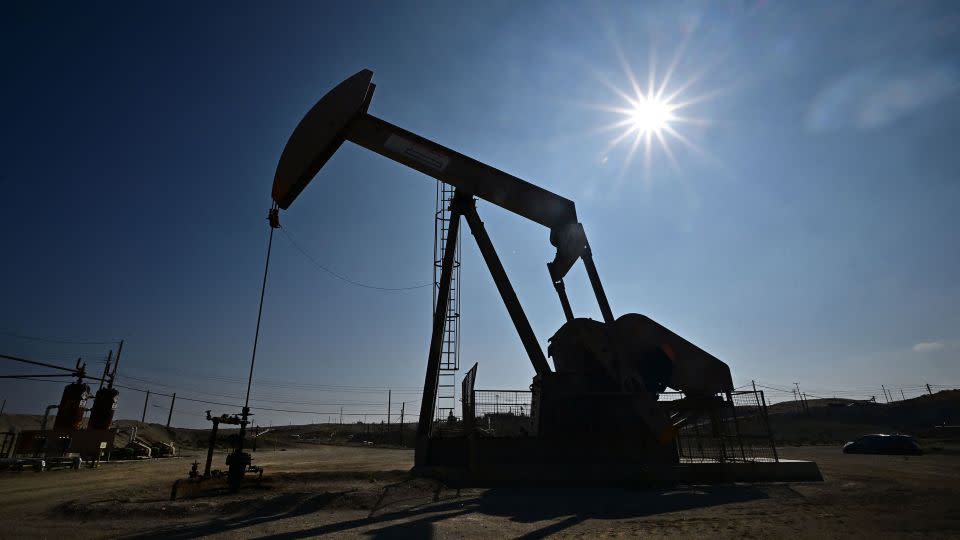Oil prices get short-lived boost from attack on Iran

Oil prices jumped overnight after explosions were reported near the Iranian city of Isfahan, but those gains dissipated Friday as officials sought to play down the latest escalation in Middle East tensions.
Brent crude, the global oil benchmark, was down 0.4% at $86.8 per barrel, having earlier spiked more than 3%. US crude futures slipped 0.3% to trade at $82.50, also reversing earlier gains.
Israel carried out a military strike inside Iran, a US official told CNN, a move that could push the oil-rich region deeper into conflict. The Israeli military has not commented, and Iran has not identified the source of the attack.
Israeli Prime Minister Benjamin Netanyahu had said Thursday that the country would make its “own decisions” when responding to Iran’s unprecedented airstrikes last weekend, most of which were intercepted. Iran launched the attack in retaliation for a suspected Israeli strike on its embassy compound in Syria earlier this month.
The overnight attack on Iran and “the threat of retaliation to it” has increased the risk to physical supply of oil, although the market response in European hours “suggests that some of that risk has already been priced in,” Neil Shearing, chief economist at consultancy Capital Economics, wrote in a note Friday.
Oil prices have gained about 15% so far this year, driven higher by fear of a wider Middle East conflict, supply curbs by the Organization of the Petroleum Exporting Countries and expectations of stronger Chinese demand.
The oil market’s biggest fear is that a wider war could disrupt shipping through the Strait of Hormuz, a narrow waterway off Iran’s southern border through which more than a quarter of global maritime oil trade flows each day.
Iran is a big oil producer but exports most of its crude to China because of long-standing international sanctions. Still, a reduction in Iranian oil exports would have a “massive” impact on the global market as China would be forced to compete with other countries for supplies, according to Richard Bronze, co-founder of data firm Energy Aspects.
There are also risks to oil supply elsewhere, analysts at ANZ, a bank, noted Friday.
The United States has announced that it will reinstate sanctions on Venezuela’s oil industry, which could disrupt its exports. Mexico also said earlier this month that it would cut back oil exports because of strong domestic demand.
Other markets also reacted strongly initially to the latest salvo in the Middle East conflict. Gold prices jumped as traders rushed into safe-haven assets, although they trimmed those gains in European hours.
Most stock markets in Asia closed sharply lower. Taiwan’s Taiex index tumbled 3.8%. Japan’s Nikkei 225 ended 2.7% down. South Korea’s Kospi closed 1.6% lower. Hong Kong’s Hang Seng index fell 1%.
The market impact weakened as Iranian state-aligned media reported that the attack appeared to be limited in scope. A regional intelligence source with knowledge of Iran’s potential reaction to Friday’s strike said direct state-to-state strikes between the country and Israel were “over.”
European stock markets were trading only slightly lower by 6:30 a.m. ET. The region’s benchmark Stoxx 600 index was 0.4% down.
Meanwhile, Israel’s benchmark Tel Aviv 125 Index, which comprises the 125 most valuable companies on the Tel Aviv Stock Exchange, was flat.
On Thursday, S&P Global Ratings cut the country’s sovereign credit rating to A+ from AA- on increased geopolitical risk from its war with Hamas and friction with Iran.
“We expect a wider regional conflict will be avoided, but the Israel-Hamas war and the confrontation with (Iran-backed) Hezbollah appear set to continue throughout 2024,” S&P analysts wrote.
Hamas attacked Israel on October 7, killing about 1,200 people and taking more than 250 hostages.
For more CNN news and newsletters create an account at CNN.com

 Yahoo Finance
Yahoo Finance 